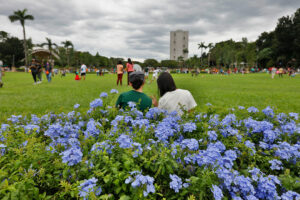By Beatriz Marie D. Cruz, Reporter
THE PHILIPPINES may have to benchmark its number of holidays against other Southeast Asian countries, as having “too much” holidays may discourage foreign investors, National Economic and Development Authority (NEDA) Secretary Arsenio M. Balisacan said.
“We are a country that is competing with other countries for investment. So of course, investors will look at productivity as a factor,” he told BusinessWorld in an Aug. 15 interview.
“We have to benchmark our holidays with the norm… You can’t go… far away from it because that will introduce disincentives for our investors.”
The Philippine Chamber of Commerce and Industry (PCCI) claimed the country has “too many holidays” with an average of 27 holidays a year, saying it was not healthy for businesses and the economy.
The PCCI tally includes special holidays declared by the Palace, but excludes other provincial and municipal holidays, as well as work suspension due to calamities.
In comparison, Malaysia has 21 holidays, Indonesia has 17, Singapore with 11, Thailand has 20, and Vietnam has six.
“Look at the entire year and if you have much, many more holidays than the alternative (countries) for them, of course, you don’t attract (foreign investors),” Mr. Balisacan said.
Earlier this month, Senate President Francis Joseph G. Escudero said the Senate plans on limiting the approval of bills on local holidays to boost the country’s competitiveness. He earlier received backlash for floating the possibility of combining or cutting the number of holidays.
Mr. Balisacan also noted that not all workers stand to benefit from the so-called “holiday economics.”
“The poor will suffer more from too many holidays,” he said.
In 2022, President Ferdinand R. Marcos, Jr. reintroduced the holiday economics policy, in which holidays are moved closer to the weekend to stimulate travel and boost tourism as the economy opened from the pandemic. This was first introduced during the Arroyo administration.
For instance, the commemoration of Ninoy Aquino Day this year was moved from Aug. 21 (Wednesday) to Aug. 23 (Friday) and declared a special non-working day.
The American Chamber of Commerce of the Philippines (AmCham Philippines) also supports the reduction of some “hero” holidays, citing additional costs and scheduling issues for businesses, AmCham Philippines Executive Director Ebb Hinchliffe said.
For the British Chamber of Commerce of the Philippines (BCCP), the number of holidays is just one of the many factors that hurts the Philippines’ attractiveness to foreign investors.
“It is a factor, but the key factor, I would say, is legislation, opening up the economy, opening up investment to foreign investors, and also, how is the general economy doing,” BCCP Executive Director and Trustee Christopher James Nelson told BusinessWorld via telephone.
The government’s existing laws already allow employees to work on holidays at the discretion of their employers, according to labor lawyer and Federation of Free Workers President Jose Sonny G. Matula.
“Under current laws, employers already have the flexibility to require employees to work on holidays, provided they pay the necessary premium. There is no need… to reduce holidays when mechanisms are already in place to balance the needs of businesses with the rights of workers,” he said in a Viber message.
The government must focus on more pressing “challenges that significantly impact the productivity and well-being of our workforce and deserve immediate attention,” Mr. Matula said.
For IBON Foundation Executive Director Jose Enrique A. Africa, the productivity of firms is better measured by skills upgrading, effective management, and general technological capacity.
Mr. Matula said the government should address the issues of low wages, heavy traffic, contractualization and job insecurity.
